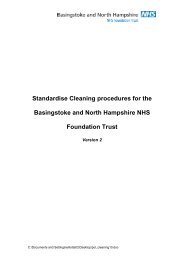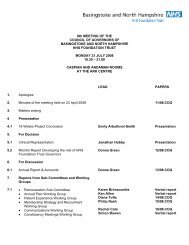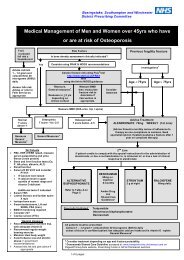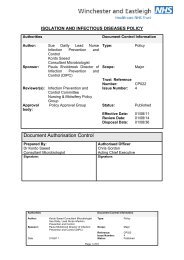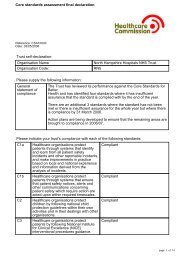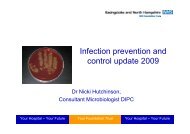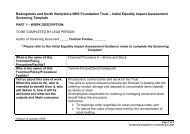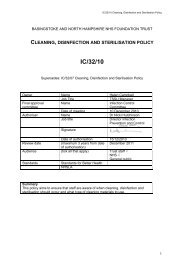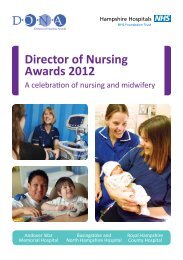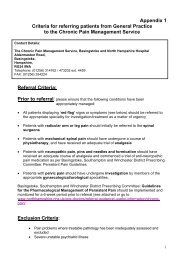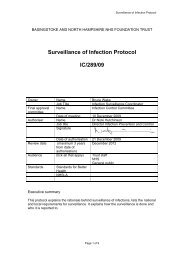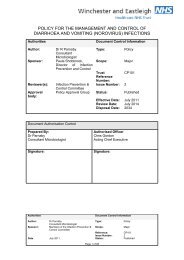New Strain Respiratory Virus Policy - Hampshire Hospitals NHS ...
New Strain Respiratory Virus Policy - Hampshire Hospitals NHS ...
New Strain Respiratory Virus Policy - Hampshire Hospitals NHS ...
Create successful ePaper yourself
Turn your PDF publications into a flip-book with our unique Google optimized e-Paper software.
Winchester & Eastleigh Healthcare <strong>NHS</strong> Trust<br />
<strong>New</strong> <strong>Strain</strong> <strong>Respiratory</strong> <strong>Virus</strong> <strong>Policy</strong><br />
into the UK but there is a well-developed laboratory based surveillance, which<br />
will help identify the pandemic strain as early as possible.<br />
Once introduced into the UK, pandemic strains are likely to spread widely in<br />
the UK within 2 - 3 weeks of first arriving in the country, peaking at around 6<br />
weeks and likely to last for about 3 - 5 months. There may be a second wave<br />
of infection a few weeks or months later and this may be more severe.<br />
All ages may be affected but children and otherwise fit adults may be at<br />
relatively greater risk if older people have residual immunity from past<br />
exposure to similar stains. This will depend on the nature of the pandemic<br />
strain.<br />
A pandemic will place considerable pressure on health and social services<br />
due to the number of patients requiring treatment, a reduced workforce due to<br />
illness and the general disruption that is likely to occur.<br />
In a worse case scenario around a quarter (25%) of the population or more is<br />
likely to develop infection. Depending on the use of anti-viral drugs and how<br />
quickly a vaccine becomes available over 50,000 deaths could occur in the<br />
UK. The expected hospital admission rate is expected to rise by at least 50%<br />
and this will be higher if the attack rate is predominantly in the elderly.<br />
A pandemic will impact on all sectors of the community through the illness<br />
itself and the consequences of staff sickness, travel restrictions, reduced<br />
transport and deliveries etc. <strong>Virus</strong>es tend to spread rapidly in schools and<br />
other closed institutions.<br />
People are likely to be advised not to travel to affected areas abroad or attend<br />
international gatherings such as large conferences and sports events. Later,<br />
depending on how the pandemic develops, it may be necessary to limit nonessential<br />
travel and discourage mass gatherings of people.<br />
There will be regular updates on the television, radio and in the national<br />
press, telling people what is happening and what to do. People with mild to<br />
moderate symptoms will be advised to stay at home. Help lines will be<br />
available for advice which will include:<br />
• Cover your mouth and nose when you sneeze or cough, using a tissue<br />
• Promptly and carefully throw the tissues away into the rubbish – “bagging<br />
and binning”.<br />
• Wash your hands often – especially after coming in from outside<br />
• Avoid touching your eyes, nose or mouth<br />
• Avoid non-essential travel and mass gatherings as far as you can<br />
• Make sure children follow this advice<br />
Authorities<br />
Document Control Information<br />
Author: Sue Daiilly Lead Nurse Infection Type:<br />
<strong>Policy</strong><br />
Control<br />
Sponsor: Paula Shobbrook Director of Infection Scope:<br />
Major<br />
Prevention and Control<br />
Reference:<br />
CP104<br />
Issue Number: 2<br />
Date May 2010 Status: Final<br />
Page 10 of 27



